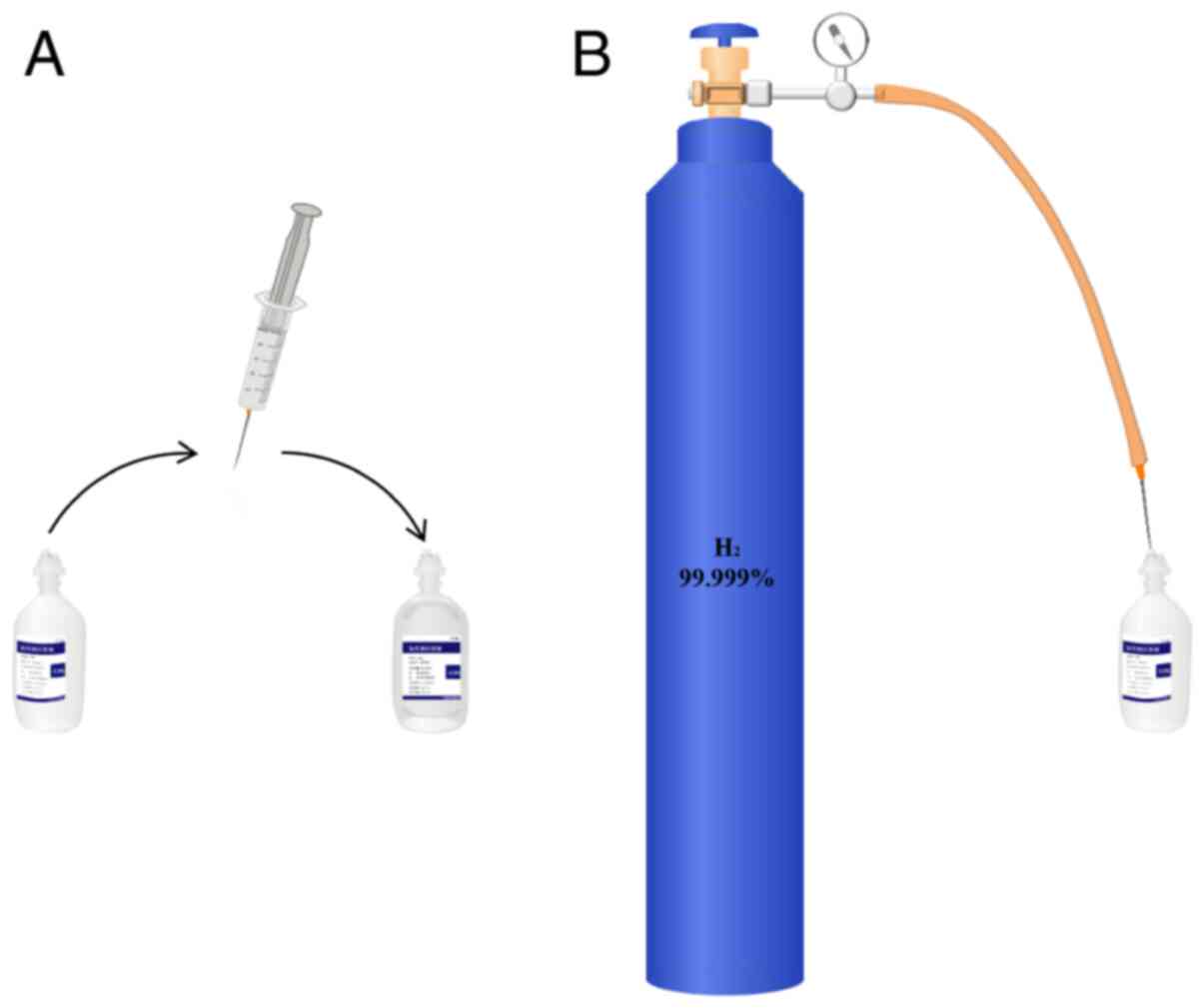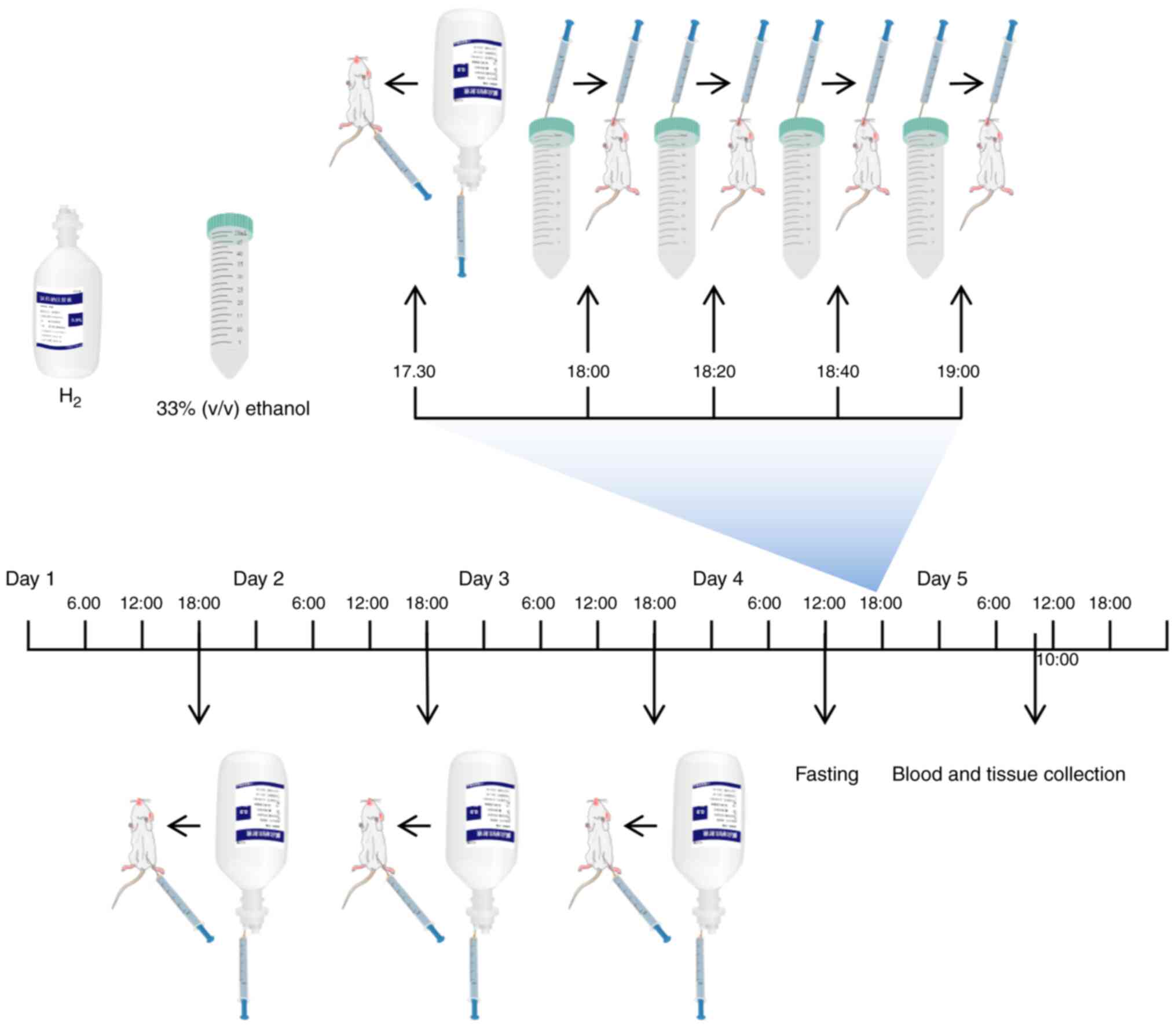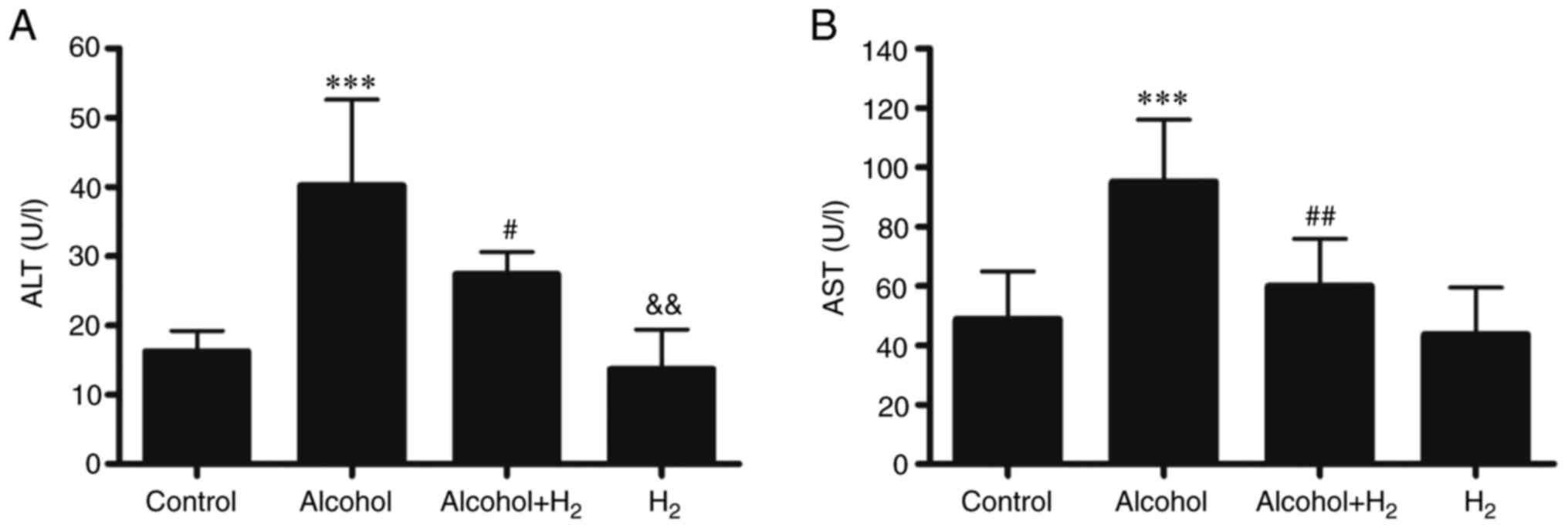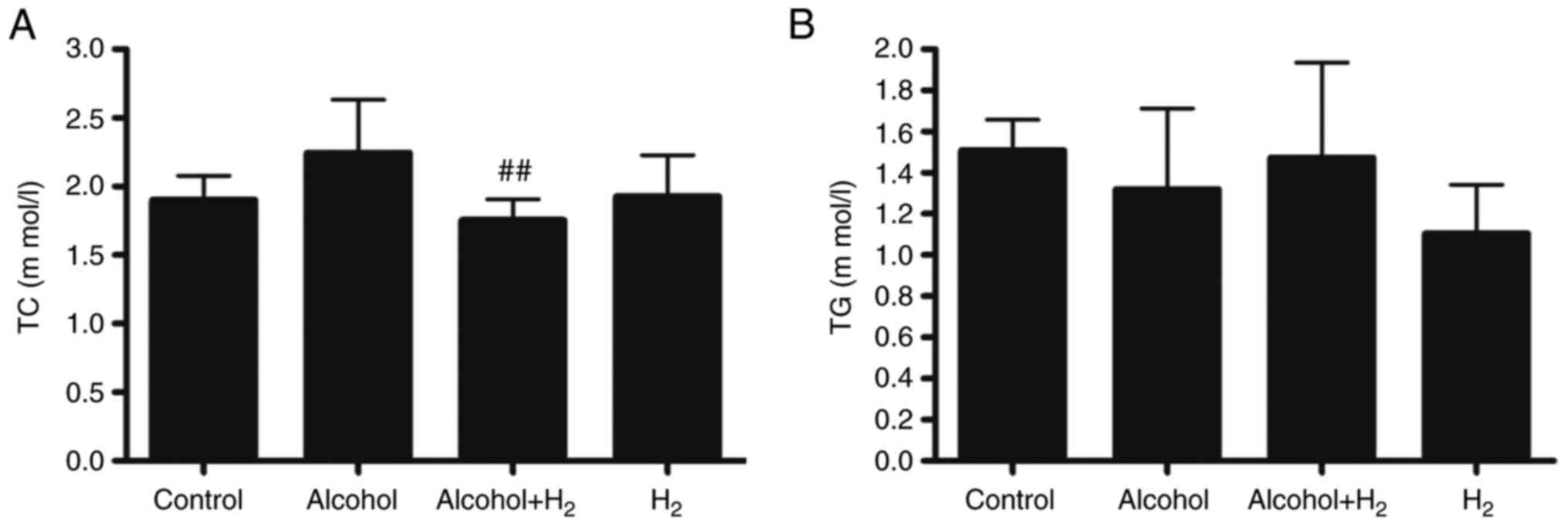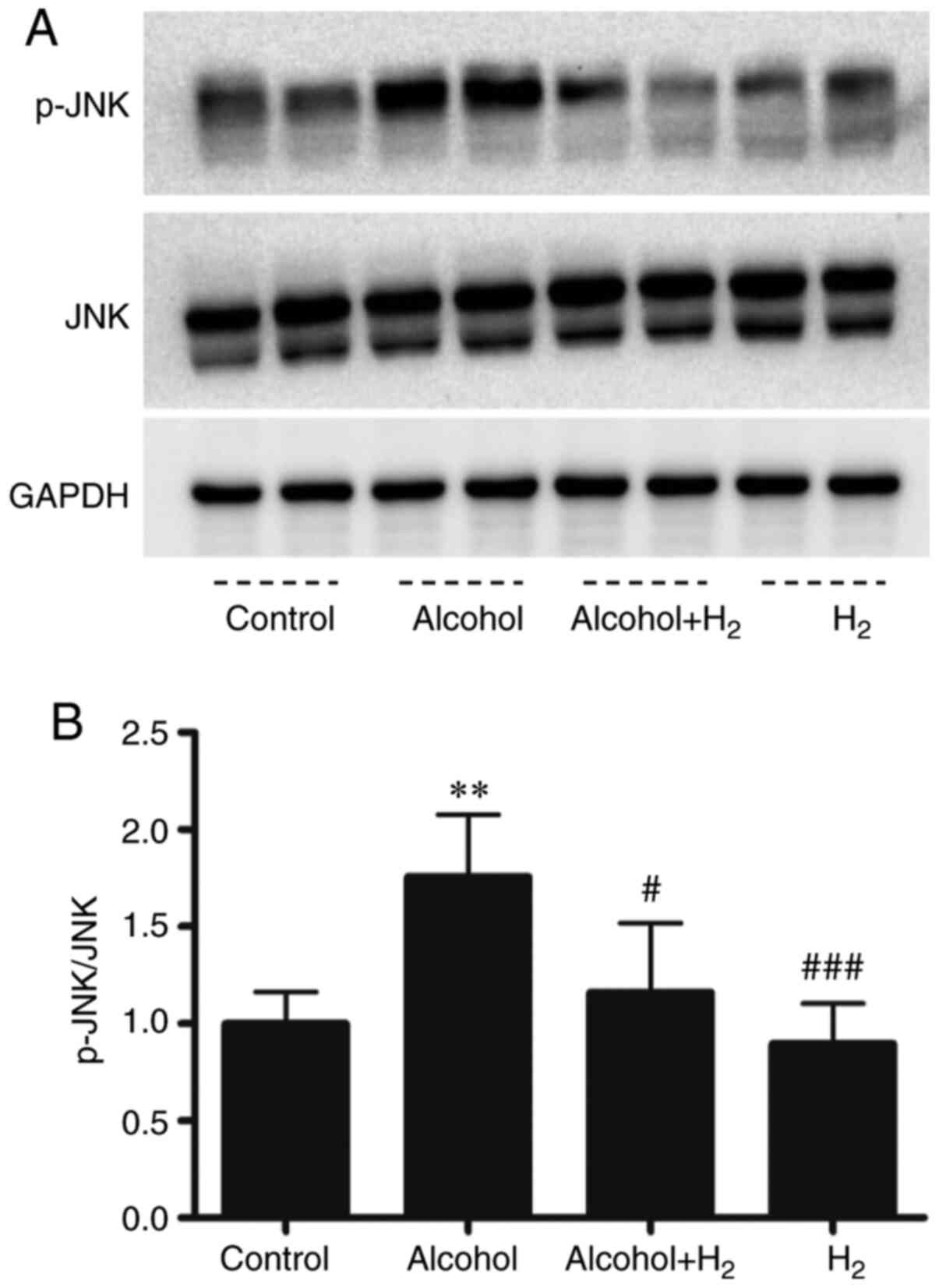|
1
|
Osna NA, Donohue TM Jr and Kharbanda KK:
Alcoholic liver disease: Pathogenesis and current management.
Alcohol Res. 38:147–161. 2017.PubMed/NCBI
|
|
2
|
Seitz HK, Bataller R, Cortez-Pinto H, Gao
B, Gual A, Lackner C, Mathurin P, Mueller S, Szabo G and Tsukamoto
H: Alcoholic liver disease. Nat Rev Dis Primers.
4(16)2018.PubMed/NCBI View Article : Google Scholar
|
|
3
|
Asrani SK, Devarbhavi H, Eaton J and
Kamath PS: Burden of liver diseases in the world. J Hepatol.
70:151–171. 2019.PubMed/NCBI View Article : Google Scholar
|
|
4
|
Lieber CS: Alcoholic liver disease: New
insights in pathogenesis lead to new treatments. J Hepatol. 32
(Suppl):113–128. 2000.PubMed/NCBI View Article : Google Scholar
|
|
5
|
Ding WX and Yang L: Alcohol and
drug-induced liver injury: Metabolism, mechanisms, pathogenesis and
potential therapies. Liver Res. 3:129–131. 2019.PubMed/NCBI View Article : Google Scholar
|
|
6
|
Gao B and Bataller R: Alcoholic liver
disease: Pathogenesis and new therapeutic targets.
Gastroenterology. 141:1572–1585. 2011.PubMed/NCBI View Article : Google Scholar
|
|
7
|
Louvet A and Mathurin P: Alcoholic liver
disease: Mechanisms of injury and targeted treatment. Nat Rev
Gastroenterol Hepatol. 12:231–242. 2015.PubMed/NCBI View Article : Google Scholar
|
|
8
|
Bajaj JS: Alcohol, liver disease and the
gut microbiota. Nat Rev Gastroenterol Hepatol. 16:235–246.
2019.PubMed/NCBI View Article : Google Scholar
|
|
9
|
Wang FS, Fan JG, Zhang Z, Gao B and Wang
HY: The global burden of liver disease: The major impact of China.
Hepatology. 60:2099–2108. 2014.PubMed/NCBI View Article : Google Scholar
|
|
10
|
Zhang Y, Tan S, Xu J and Wang T: Hydrogen
therapy in cardiovascular and metabolic diseases: From bench to
bedside. Cell Physiol Biochem. 47:1–10. 2018.PubMed/NCBI View Article : Google Scholar
|
|
11
|
Zhang Y, Xu J and Yang H: Hydrogen: An
endogenous regulator of liver homeostasis. Front Pharmacol.
11(877)2020.PubMed/NCBI View Article : Google Scholar
|
|
12
|
Sun H, Chen L, Zhou W, Hu L, Li L, Tu Q,
Chang Y, Liu Q, Sun X, Wu M, et al: The protective role of
hydrogen-rich saline in experimental liver injury in mice. J
Hepatol. 54:471–480. 2011.PubMed/NCBI View Article : Google Scholar
|
|
13
|
Liu Q, Li BS, Song YJ, Hu MG, Lu JY, Gao
A, Sun XJ, Guo XM and Liu R: Hydrogen-rich saline protects against
mitochondrial dysfunction and apoptosis in mice with obstructive
jaundice. Mol Med Rep. 13:3588–3596. 2016.PubMed/NCBI View Article : Google Scholar
|
|
14
|
Fukuda K, Asoh S, Ishikawa M, Yamamoto Y,
Ohsawa I and Ohta S: Inhalation of hydrogen gas suppresses hepatic
injury caused by ischemia/reperfusion through reducing oxidative
stress. Biochem Biophys Res Commun. 361:670–674. 2007.PubMed/NCBI View Article : Google Scholar
|
|
15
|
Yang SC, Chen LL, Fu T, Li WY and Ji ES:
Improvement of hydrogen on liver oxidative stress injury in chronic
intermittent hypoxia rats. Zhongguo Ying Yong Sheng Li Xue Za Zhi.
34:61–64. 2018.PubMed/NCBI View Article : Google Scholar : (In Chinese).
|
|
16
|
Chen M, Jiang L, Li Y, Bai G, Zhao J,
Zhang M and Zhang J: Hydrogen protects against liver injury during
CO2 pneumoperitoneum in rats. Oncotarget. 9:2631–2645.
2017.PubMed/NCBI View Article : Google Scholar
|
|
17
|
Kawai D, Takaki A, Nakatsuka A, Wada J,
Tamaki N, Yasunaka T, Koike K, Tsuzaki R, Matsumoto K, Miyake Y, et
al: Hydrogen-rich water prevents progression of nonalcoholic
steatohepatitis and accompanying hepatocarcinogenesis in mice.
Hepatology. 56:912–921. 2012.PubMed/NCBI View Article : Google Scholar
|
|
18
|
Lin CP, Chuang WC, Lu FJ and Chen CY:
Anti-oxidant and anti-inflammatory effects of hydrogen-rich water
alleviate ethanol-induced fatty liver in mice. World J
Gastroenterol. 23:4920–4934. 2017.PubMed/NCBI View Article : Google Scholar
|
|
19
|
Huang G, Zhou J, Zhan W, Xiong Y, Hu C, Li
X, Li X, Li Y and Liao X: The neuroprotective effects of
intraperitoneal injection of hydrogen in rabbits with cardiac
arrest. Resuscitation. 84:690–695. 2013.PubMed/NCBI View Article : Google Scholar
|
|
20
|
Tan S, Long Z, Hou X, Lin Y, Xu J, You X,
Wang T and Zhang Y: H2 protects against
lipopolysaccharide-induced cardiac dysfunction via blocking
TLR4-mediated cytokines expression. Front Pharmacol.
10(865)2019.PubMed/NCBI View Article : Google Scholar
|
|
21
|
Zhang Y, Long Z, Xu J, Tan S, Zhang N, Li
A, Wang L and Wang T: Hydrogen inhibits isoproterenol induced
autophagy in cardiomyocytes in vitro and in vivo. Mol
Med Rep. 16:8253–8258. 2017.PubMed/NCBI View Article : Google Scholar
|
|
22
|
Zhang Y, Xu J, Long Z, Wang C, Wang L, Sun
P, Li P and Wang T: Hydrogen (H2) inhibits
isoproterenol-induced cardiac hypertrophy via antioxidative
pathways. Front Pharmacol. 7(392)2016.PubMed/NCBI View Article : Google Scholar
|
|
23
|
Zhang YX, Xu JT, You XC, Wang C, Zhou KW,
Li P, Sun P, Wang L and Wang TH: Inhibitory effects of hydrogen on
proliferation and migration of vascular smooth muscle cells via
down-regulation of mitogen/activated protein kinase and
ezrin-radixin-moesin signaling pathways. Chin J Physiol. 59:46–55.
2016.PubMed/NCBI View Article : Google Scholar
|
|
24
|
Ding WX, Li M, Chen X, Ni HM, Lin CW, Gao
W, Lu B, Stolz DB, Clemens DL and Yin XM: Autophagy reduces acute
ethanol-induced hepatotoxicity and steatosis in mice.
Gastroenterology. 139:1740–1752. 2010.PubMed/NCBI View Article : Google Scholar
|
|
25
|
Polhemus DJ, Trivedi RK, Gao J, Li Z,
Scarborough AL, Goodchild TT, Varner KJ, Xia H, Smart FW, Kapusta
DR, et al: Renal sympathetic denervation protects the failing heart
via inhibition of neprilysin activity in the kidney. J Am Coll
Cardiol. 70:2139–2153. 2017.PubMed/NCBI View Article : Google Scholar
|
|
26
|
Hill JA, Karimi M, Kutschke W, Davisson
RL, Zimmerman K, Wang Z, Kerber RE and Weiss RM: Cardiac
hypertrophy is not a required compensatory response to short-term
pressure overload. Circulation. 101:2863–2869. 2000.PubMed/NCBI View Article : Google Scholar
|
|
27
|
Frankenberg L: Cardiac puncture in the
mouse through the anterior thoracic aperture. Lab Anim. 13:311–312.
1979.PubMed/NCBI View Article : Google Scholar
|
|
28
|
Kaur H, Fisher K and Othman M:
Thromboelastography testing in mice following blood collection from
facial vein and cardiac puncture. Blood Coagul Fibrinolysis.
30:366–369. 2019.PubMed/NCBI View Article : Google Scholar
|
|
29
|
Zhang Y, Zhou G, Chen Z, Guan W, Zhang J,
Bi M, Wang F, You X, Liao Y, Zheng S, et al: Si-Wu-Tang alleviates
nonalcoholic fatty liver disease via blocking TLR4-JNK and
Caspase-8-GSDMD signaling pathways. Evid Based Complement Alternat
Med. 2020(8786424)2020.PubMed/NCBI View Article : Google Scholar
|
|
30
|
Zhang Y, Zhang J, Xu K, Chen Z, Xu X, Xu
J, Zheng S, Dai M and Yang H: Helium protects against
lipopolysaccharide-induced cardiac dysfunction in mice via
suppressing Toll-like receptor 4-nuclear factor κB-tumor necrosis
factor-alpha/interleukin-18 signaling. Chin J Physiol. 63:276–285.
2020.PubMed/NCBI View Article : Google Scholar
|
|
31
|
Nishitani Y and Matsumoto H: Ethanol
rapidly causes activation of JNK associated with ER stress under
inhibition of ADH. FEBS Lett. 580:9–14. 2006.PubMed/NCBI View Article : Google Scholar
|
|
32
|
Manieri E, Folgueira C, Rodríguez ME,
Leiva-Vega L, Esteban-Lafuente L, Chen C, Cubero FJ, Barrett T,
Cavanagh-Kyros J, Seruggia D, et al: JNK-mediated disruption of
bile acid homeostasis promotes intrahepatic cholangiocarcinoma.
Proc Natl Acad Sci USA. 117:16492–16499. 2020.PubMed/NCBI View Article : Google Scholar
|
|
33
|
Yang L, Wu D, Wang X and Cederbaum AI:
Cytochrome P4502E1, oxidative stress, JNK, and autophagy in acute
alcohol-induced fatty liver. Free Radic Biol Med. 53:1170–1180.
2012.PubMed/NCBI View Article : Google Scholar
|
|
34
|
Ortiz M, Soto-Alarcón SA, Orellana P,
Espinosa A, Campos C, López-Arana S, Rincón MA, Illesca P,
Valenzuela R and Videla LA: Suppression of high-fat diet-induced
obesity-associated liver mitochondrial dysfunction by
docosahexaenoic acid and hydroxytyrosol co-administration. Dig
Liver Dis. 52:895–904. 2020.PubMed/NCBI View Article : Google Scholar
|
|
35
|
Valenzuela R and Videla LA: Impact of the
co-administration of N-3 fatty acids and olive oil components in
preclinical nonalcoholic fatty liver disease models: A mechanistic
view. Nutrients. 12(499)2020.PubMed/NCBI View Article : Google Scholar
|
|
36
|
Nevzorova YA, Boyer-Diaz Z, Cubero FJ and
Gracia-Sancho J: Animal models for liver disease-A practical
approach for translational research. J Hepatol. 73:423–440.
2020.PubMed/NCBI View Article : Google Scholar
|
|
37
|
Dole M, Wilson FR and Fife WP: Hyperbaric
hydrogen therapy: A possible treatment for cancer. Science.
190:152–154. 1975.PubMed/NCBI View Article : Google Scholar
|
|
38
|
Ohsawa I, Ishikawa M, Takahashi K,
Watanabe M, Nishimaki K, Yamagata K, Katsura K, Katayama Y, Asoh S
and Ohta S: Hydrogen acts as a therapeutic antioxidant by
selectively reducing cytotoxic oxygen radicals. Nat Med.
13:688–694. 2007.PubMed/NCBI View
Article : Google Scholar
|
|
39
|
Sun Q, Kawamura T, Masutani K, Peng X, Sun
Q, Stolz DB, Pribis JP, Billiar TR, Sun X, Bermudez CA, et al: Oral
intake of hydrogen-rich water inhibits intimal hyperplasia in
arterialized vein grafts in rats. Cardiovasc Res. 94:144–153.
2012.PubMed/NCBI View Article : Google Scholar
|
|
40
|
Chang L, Kamata H, Solinas G, Luo JL,
Maeda S, Venuprasad K, Liu YC and Karin M: The E3 ubiquitin ligase
itch couples JNK activation to TNFalpha-induced cell death by
inducing c-FLIP(L) turnover. Cell. 124:601–613. 2006.PubMed/NCBI View Article : Google Scholar
|
|
41
|
Kamata H, Honda S, Maeda S, Chang L,
Hirata H and Karin M: Reactive oxygen species promote
TNFalpha-induced death and sustained JNK activation by inhibiting
MAP kinase phosphatases. Cell. 120:649–661. 2005.PubMed/NCBI View Article : Google Scholar
|
|
42
|
Wang X and Wang J: High-content hydrogen
water-induced downregulation of miR-136 alleviates non-alcoholic
fatty liver disease by regulating Nrf2 via targeting MEG3. Biol
Chem. 399:397–406. 2018.PubMed/NCBI View Article : Google Scholar
|
|
43
|
Zhai X, Chen X, Lu J, Zhang Y, Sun X,
Huang Q and Wang Q: Hydrogen-rich saline improves non alcoholic
fatty liver disease by alleviating oxidative stress and activating
hepatic PPARα and PPARγ. Mol Med Rep. 15:1305–1312. 2017.PubMed/NCBI View Article : Google Scholar
|
|
44
|
Liu B, Xue J, Zhang M, Wang M, Ma T, Zhao
M, Gu Q and Qin S: Hydrogen inhalation alleviates nonalcoholic
fatty liver disease in metabolic syndrome rats. Mol Med Rep.
22:2860–2868. 2020.PubMed/NCBI View Article : Google Scholar
|
|
45
|
Hernández-Rodas MC, Valenzuela R,
Echeverría F, Rincón-Cervera MÁ, Espinosa A, Illesca P, Muñoz P,
Corbari A, Romero N, Gonzalez-Mañan D, et al: Supplementation with
docosahexaenoic acid and extra virgin olive oil prevents liver
steatosis induced by a high-fat diet in mice through PPAR-α and
Nrf2 upregulation with concomitant SREBP-1c and NF-κB
downregulation. Mol Nutr Food Res. 61(61)2017.PubMed/NCBI View Article : Google Scholar
|
|
46
|
Li L, Fu J, Liu D, Sun J, Hou Y, Chen C,
Shao J, Wang L, Wang X, Zhao R, et al: Hepatocyte-specific Nrf2
deficiency mitigates high-fat diet-induced hepatic steatosis:
Involvement of reduced PPARγ expression. Redox Biol.
30(101412)2020.PubMed/NCBI View Article : Google Scholar
|
|
47
|
Ambade A, Catalano D, Lim A, Kopoyan A,
Shaffer SA and Mandrekar P: Inhibition of heat shock protein 90
alleviates steatosis and macrophage activation in murine alcoholic
liver injury. J Hepatol. 61:903–911. 2014.PubMed/NCBI View Article : Google Scholar
|
|
48
|
Lamlé J, Marhenke S, Borlak J, von
Wasielewski R, Eriksson CJ, Geffers R, Manns MP, Yamamoto M and
Vogel A: Nuclear factor-eythroid 2-related factor 2 prevents
alcohol-induced fulminant liver injury. Gastroenterology.
134:1159–1168. 2008.PubMed/NCBI View Article : Google Scholar
|
|
49
|
Ji C, Chan C and Kaplowitz N: Predominant
role of sterol response element binding proteins (SREBP) lipogenic
pathways in hepatic steatosis in the murine intragastric ethanol
feeding model. J Hepatol. 45:717–724. 2006.PubMed/NCBI View Article : Google Scholar
|
|
50
|
Nakajima T, Kamijo Y, Tanaka N, Sugiyama
E, Tanaka E, Kiyosawa K, Fukushima Y, Peters JM, Gonzalez FJ and
Aoyama T: Peroxisome proliferator-activated receptor alpha protects
against alcohol-induced liver damage. Hepatology. 40:972–980.
2004.PubMed/NCBI View Article : Google Scholar
|
|
51
|
Valenzuela R and Videla LA: Crosstalk
mechanisms in hepatoprotection: Thyroid hormone-docosahexaenoic
acid (DHA) and DHA-extra virgin olive oil combined protocols.
Pharmacol Res. 132:168–175. 2018.PubMed/NCBI View Article : Google Scholar
|
|
52
|
Hartmann P, Seebauer CT and Schnabl B:
Alcoholic liver disease: The gut microbiome and liver cross talk.
Alcohol Clin Exp Res. 39:763–775. 2015.PubMed/NCBI View Article : Google Scholar
|
|
53
|
Wolf PG, Biswas A, Morales SE, Greening C
and Gaskins HR: H2 metabolism is widespread and diverse
among human colonic microbes. Gut Microbes. 7:235–245.
2016.PubMed/NCBI View Article : Google Scholar
|
|
54
|
Tanabe H, Sasaki Y, Yamamoto T, Kiriyama S
and Nishimura N: Suppressive effect of high hydrogen generating
high amylose cornstarch on subacute hepatic ischemia-reperfusion
injury in rats. Biosci Microbiota Food Health. 31:103–108.
2012.PubMed/NCBI View Article : Google Scholar
|
|
55
|
Kajiya M, Sato K, Silva MJ, Ouhara K, Do
PM, Shanmugam KT and Kawai T: Hydrogen from intestinal bacteria is
protective for concanavalin A-induced hepatitis. Biochem Biophys
Res Commun. 386:316–321. 2009.PubMed/NCBI View Article : Google Scholar
|
|
56
|
Yu J, Zhang W, Zhang R, Ruan X, Ren P and
Lu B: Lactulose accelerates liver regeneration in rats by inducing
hydrogen. J Surg Res. 195:128–135. 2015.PubMed/NCBI View Article : Google Scholar
|
|
57
|
Zhao L, Wang Y, Zhang G, Zhang T, Lou J
and Liu J: L-arabinose elicits gut-derived hydrogen production and
ameliorates metabolic syndrome in C57BL/6J mice on high-fat-diet.
Nutrients. 11(3054)2019.PubMed/NCBI View Article : Google Scholar
|















